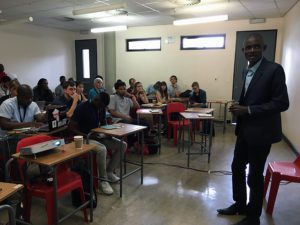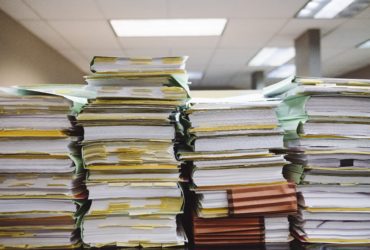Editor’s note: Over the past year, the Fund for Investigative Journalism sent several foreign-based grant recipients to conferences to help them hone their investigative skills. Christian Locka of Cameroon and Mark Olalde, an American based in South Africa, recently attended the African Investigative Journalism Conference held at the University of the Witwatersrand in Johannesburg.

For American in South Africa, FIJ provides opportunity to go beyond ‘parachute journalism’
By Mark Olalde
It is never fun sitting through a verbal attack on your work and your industry, even if it is deserved. Time and again at the inspiring, frustrating and eye-opening African Investigative Journalism Conference held at the University of the Witwatersrand in Johannesburg, African journalists grumbled about “parachute journalism” and Western reporters, including an American one like me.
At the conference’s closing “lighting talks,” I finally worked up the courage to volunteer to talk about my own work. I explained – through my Chicago accent – how the Fund for Investigative Journalism had allowed me to move past the parachute, now spending the better part of the past year and a half in Africa to thoroughly investigate South Africa’s abandoned mines.
Maybe I changed a few minds. After my talk, I was approached by a number of reporters looking for advice, looking to talk and looking to help.
During the conference, I was inspired by the stories African journalists produced even with different levels of formal training, frustrated by the sometimes slow speed at which new ideas permeate African media and encouraged by the potential for cross-border collaboration in such a diverse continent.
I attended classes to learn where to look for useful public databases, how to use more efficient methods of cleaning large datasets and how to easily create maps from my reporting. I attended talks to hear journalists from around the continent explain how they produced compelling investigations: rhino poaching in Namibia, blood diamonds in Cameroon, extrajudicial murders by police in Kenya and many more.
Additionally, I had the great pleasure of meeting great journalists with similar reporting interests. I am in talks with some of them since the conference, and one particular relationship with a group of data journalists might prove useful in my reporting for my current FIJ grant.
Finally, it was great to meet board members Cheryl Thompson and Ron Nixon, who took their time to express interest in my work. As always, I greatly appreciate the Fund’s support for my work, and I look forward to collaborations initiated at this conference.
*******
Conference broadens opportunities for collabaoration
By Christian Locka
I would like to express my sincere thanks to the Fund for Investigative Journalism, which sent me to the conference as a training fellow. One regret, however, is that the busy agenda prevented me from spending more time with FIJ board members Ron Nixon and Cheryl Thompson, who both attended the conference.
During the conference, I had the honor of making three presentations. One outlined my investigation over the so-called blood diamonds. Another topic focused on undercover journalism, including why and when the practice should be used, how to be safe, what tools to use and what to avoid. And finally, I spoke about what it’s like to practice investigative journalism in a French-speaking country like mine, Cameroon.
Although I spent a lot of time talking about my work, I also had the opportunity to learn from the other presenters and speakers on topics such as defamation, data journalism and coding, security in conflict zones, cross-border cooperation and storytelling. I made a lot of contacts, and hope for collaborations in the future.



